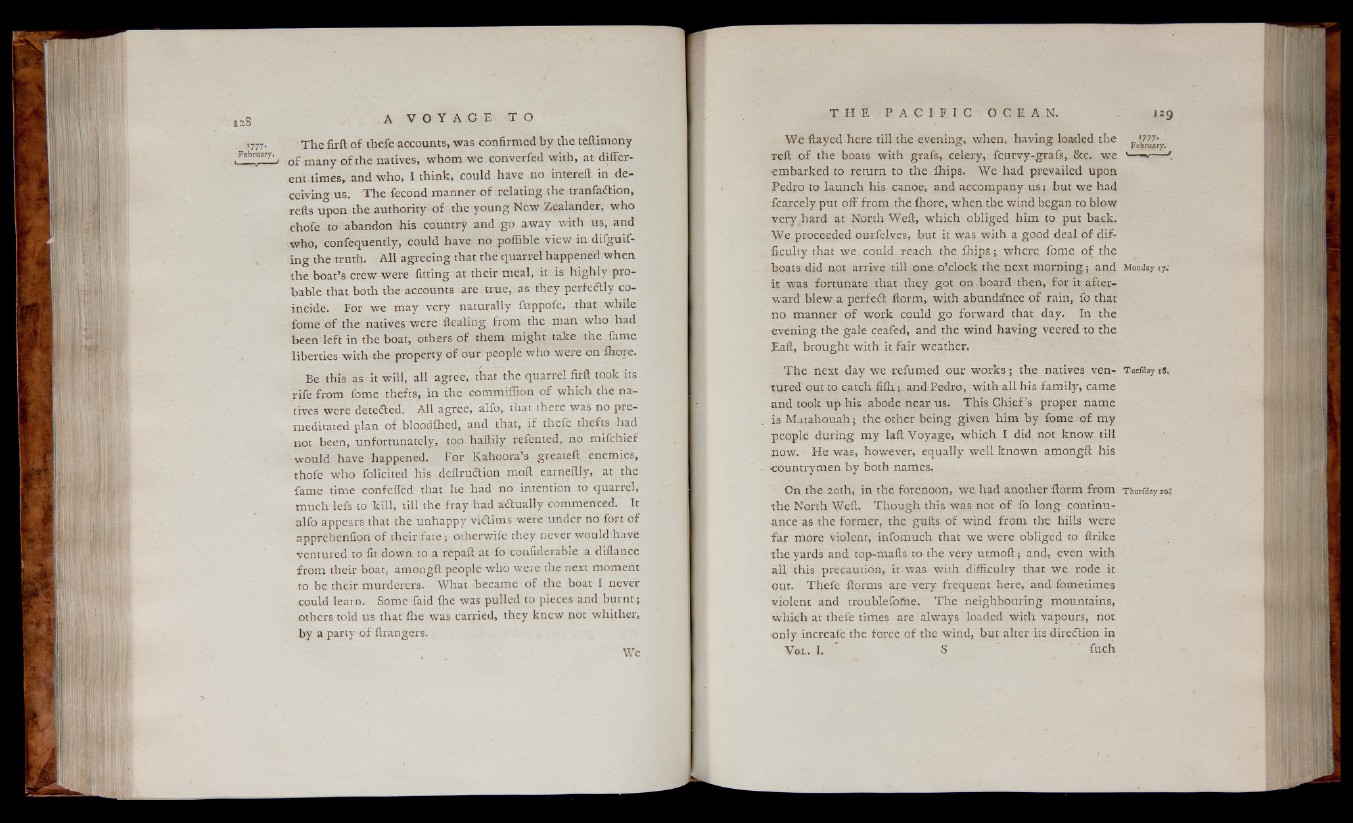
1777- The firft of thefe accounts, -was confirmed by the teftimony
Fcbraary.^ ^ many 0f the natives, whom we converfed with, at different
times, and who, I think, could have no intereft in deceiving
us. The fécond manner of relating the tranfa&ion,
refis upon the authority of the young New Zealander, who
chofe to abandon his country and go away with us, and
who, confequently, could have no poflible view in difguif-
ing the truth. All agreeing that the quarrel happened when
the boat’s crew were fitting at their meal, it is highly probable
that both the accounts are true, as they perfeftly coincide.
For we may very naturally fuppofe, that while
fome of the natives were ftealing from the man who had
been left in the boat, others of them might take the fame
liberties with the property of our people who were on ihore.
Be this as it will, all agree, that the quarrel firft took its
rife from fome thefts, in the commiffion of which the natives
were detedled. All agree, alfo, that there was no premeditated
plan of bloodihed, and that, if thefe thefts had
not been, unfortunately, too haftily refented, no mifchief
would have happened. For Kahoora’s greateft enemies,
thofe who folicited his .deftru&ion moft earneftly, at the
fame time confeffed that he had no intention to quarrel,
much lefs to kill, till the fray had a&ually commenced. It
alfo appears that the unhappy victims were under no fort of
apprehenfion of their fate ; otherwife they never would have
ventured to fit down to a repaft at fo confiderable a diftance
from their boat, amongft people who were the next moment
to be their murderers. What became of the boat I never
could learn. Some faid file was pulled to pieces and burnt ;
others told us that ihe was carried, they knew not whither,
by a party of ftrangers.
We
We flayed here till the evening, when, having loaded the
reft of the boats with grafs, celery, fcurvy-grafs, See. we
embarked to return to the fhips. We had prevailed upon
Pedro to launch his canoe, and accompany us; but we had
fcarcely put off from the ihore, when the wind began to blow
very hard at North Weft, which obliged him to put back.
We proceeded ourfelves, but it was with a good deal of difficulty
that we could reach the fhips; where fome o f the
boats did not arrive till one o’clock the next morning 5 and Monday 17:
it was fortunate that they got on board then, for it afterward
blew a perfeft ftorm, with abunda'nee of rain, fo that
no manner o f work could go forward that day. In the
evening the gale ceafed, and the wind having veered to the
Eaft, brought with it fair weather.
The next day we refumed .our works; the natives ven- Tuefday is,
tured out to catch fifh; and Pedro, with all his family, came
and took up his abode near us. This Chief’s proper name
is Matahouah; the other being given him by fome o f my
people during my laft Voyage, which I did not know till
now. He was, however, equally well known amongft his
countrymen by both names.
On the 20th, in the forenoon, we had another ftorm from Thurfday 2«;
the North Weft. Though this was not of fo long continuance
as the former, the gufts of wind from the hills were
far more violent, infomuch that we were obliged to ftrike
the yards and top-mafts to the very utmoft; and, even with
all this precaution, it.was with difficulty that we rode it
out. Thefe ftorms are very frequent here, and fometimes
violent and troublefofhe. The neighbouring mountains,
which at thefe times are always loaded with vapours, not
■only increafe the force of the wind, but alter its direction in
Via. I, ' . S . * fuch